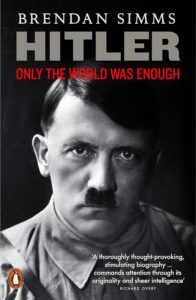For now, Hitler regarded the Slavs as the victims of Jewish capitalism, a fate they shared with the Germans, and hoped for the restoration of the ‘true’ Russian spirit in the Soviet Union. There was no sign yet of any territorial ambitions in the east. Pity, not hostility, was Hitler’s main sentiment towards Russians at this point .
At the end of March 1920, Hitler took off his army uniform for good. By then, some of the main outlines of his world view, expressed consistently in private correspondence, public meetings and newspapers articles alike, were clearly visible: fear of the western allies, especially Britain, a profound demographic anxiety about the United States, a violent hostility to international capitalism, a sense of the subversive effects of socialism and communism, and, of course, a virulent anti-Semitism.
None of these sentiments were visible before 1914. Fear of Britain and the ‘world of enemies’ was first expressed at the start of the conflict. The rest were a response not to defeat as such, or even to the revolution, but to the consequences of defeat. It was the Versailles settlement which brought home the meaning of November 1918. This was the subject of his first known political speech and its consequences dominated his later thinking. Unlike for most nationalists, territorial losses were the least of Hitler’s concerns: as we have seen, he was far more worried about the long-term impact of perpetual debt bondage, the continued blockade and a resulting surge in emigration.
In other words, it was not the war that made Hitler, or even the revolution, but the peace.
